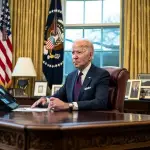Israeli Prime Minister Benjamin Netanyahu’s much-anticipated address to Congress this week in Washington comes on the heels of a conspicuous snubbing from President Joe Biden and Vice President Kamala Harris. While Biden’s office attempted to cloak his absence in a haze of COVID excuses, it’s hard to ignore that the president’s deadlines and commitments have become a bit too flexible. It seems the White House physician confirmed that Biden is indeed healthy and capable of fulfilling his presidential responsibilities—essentially rendering the COVID excuse a convenient cover for skipping out on an important ally.
The Vice President’s excuse for her absence? She simply couldn’t tear herself away from a scheduled speech to a sorority in Indianapolis. Talk about priorities. One has to wonder whether her audience of college women is truly more pressing than discussing critical matters of global importance with one of America’s longest-standing allies. This sets an interesting precedent where academia appears to overshadow international diplomacy, all thanks to the current administration’s misguided approach to leadership.
Israeli PM #BenjaminNetanyahu addresses joint session of US Congress in #WashingtonDC
Netanyahu spoke on the war, while narrating stories of hostages and their families
He also accused #Iran of fueling the protests
Watch #NationTonight with @ShreyaOpines pic.twitter.com/oKUEjpaYUi
— Mirror Now (@MirrorNow) July 25, 2024
As Netanyahu prepared to take the stage before Congress, one could almost hear the sighs of frustration emanating from Conservative circles. The Prime Minister’s message is crucial as tensions in the Middle East continue to escalate, and having both Biden and Harris absent not only disrespects Israel but also reflects poorly on the United States’ commitment to standing by its allies. This is not just another speech; it’s a critical opportunity to bolster ties and discuss strategies against threats like Iran and rising anti-Semitism globally.
The optics are clear, and they are not in favor of the Democrats. Netanyahu’s visit and subsequent speech provide a stark contrast to the previous administration, where alliances were prioritized, and meetings were not passively postponed. Instead of showcasing a robust foreign policy, the current administration seems content with the backdrop of social engagements that have little to no impact on the lives of American citizens or global stability.
Netanyahu’s address was sure to resonate with Conservative Americans who view unwavering support for Israel as a cornerstone of U.S. foreign policy. As he lays out his vision for the future and strengthens ties within Congress, one must wonder how the absence of the two highest officials in the country will reflect on public perception and potential future alliances. In a world fraught with challenges, letting a serious diplomatic engagement fall through the cracks to attend a sorority entrusts more than just political optics; it risks the stability of international relationships that have been cultivated for decades.




